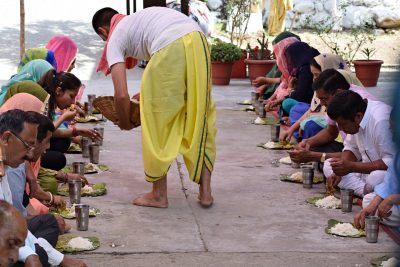Covid-19, Hunger and Starvation in India. Globalist Takeover of India’s Public Health Policy

Some might ask why India is in complete lockstep with global lockdown despite the very low COVID19-related mortality figures for 1.3 billion people. Following this introduction is a two-hour interview with investigative journalist Kapil Bajaj. It focuses on the Public Health Foundation of India and how the Gates Foundation-pharma cabal bought influence, embedded itself within government machinery and is determining India’s lockdown and public health policy. According to Bajaj, it has effectively privatised and taken over the state’s public health agenda.
In India, tens of millions are in danger of acute hunger and starvation. Lockdown has caused massive population displacement, probably the biggest since independence as millions of migrant workers returned to their villages, and has devastated livelihoods, especially among the poorest sections of society.
Even with the inflated COVID-related global death figures we see, those figures could be massively outstripped by the impacts of lockdown.
A study published in the Lancet in May predicted that globally possibly an additional 6,000 children could die every day from preventable causes over the next six months as the response to COVID-19 continues to weaken health systems and disrupt routine services. Based on the worst of three scenarios in 118 low- and middle-income countries, the analysis estimates that an additional 1.2 million under-five deaths could occur in just six months due to reductions in routine health service coverage levels and an increase in child wasting.
These potential child deaths will be in addition to the 2.5 million children who already die before their 5th birthday every six months in the 118 countries included in the study. Some 56,700 more maternal deaths could also occur in just six months.
The study warns that in the least severe scenario, there would be a 9.8 per cent increase in under-five child deaths, or an estimated 1,400 a day, and an 8.3 per cent increase in maternal deaths. In the worst-case scenario, where health interventions are reduced by around 45 per cent, there could be as much as a 44.7 per cent increase in under-five child deaths and a 38.6 per cent increase in maternal deaths per month. If routine health care is disrupted and access to food is decreased, the increase in child and maternal deaths will be devastating.
India is listed as one of the 10 countries that could potentially have the largest number of additional child deaths. With this in mind, Pratyush Singh (researcher specialising in social medicine and community health) writes on The Wire website:
“India has the largest number of TB deaths in the world with more than 1200 people dying every day. As more TB patients find it difficult to get tested or access medicine this figure is almost certainly increasing… The list of diseases killing and disabling people is very long in India and every day that it ignores them, more and more are dying. The possibility of how the coronavirus phenomenon is killing more people than the infection itself is worth considering.”
He says that more than 200,000 new patients of end-stage renal disease are added every year, which incrementally adds to more than 30 million dialysis episodes per year. It is worth considering that a dialysis centre is least 50 kilometres away for almost 60 per cent of Indians. Singh says that as most kidney patients in India depend on haemodialysis that might require as many as five sessions per week, their travails during the lockdown are apparent.
In India, severe diarrhoea is responsible for the deaths of one in four neonatal children in India. Again, Singh notes that timely hospitalised care is the only safety net for an undernourished infant.
Singh provides a damning indictment (“delinquent neglect”) of India’s (increasingly privatised) healthcare system which prior to lockdown was for many already difficult to access and woefully neglected in terms of public spending. He notes that India has the highest under-five mortality rate in the world, which means that more than 3,000 families lose their children under the age of five every day:
“Close to 30,000 mothers die due to pregnancy-related issues in 2017 as per UNICEF data and Indian government estimates show that only 21% of expecting mothers receive complete antenatal care.”
Singh concludes:
“More children will die of starvation and lack of healthcare than from the coronavirus infection. Please remember that the first Comprehensive National Nutritional Survey (2016-18) in the country reported that less than 7% of the country’s children under the age of two receive the global minimum acceptable diet.”
Now that pressure is building to fully open up economies, Bill Gates, the WHO and strategically co-opted figures are shouting about the coming of the ‘second wave’. Have no doubt, they will try to keep this pot boiling.
…
*
Note to readers: please click the share buttons above or below. Forward this article to your email lists. Crosspost on your blog site, internet forums. etc.
Featured image is from Pixabay

